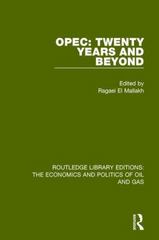Question
Consider a team of agents. Agent chooses effort 0 for = 1,2, ... , . There is no uncertainty and the total output = =1
Consider a team of agents. Agent chooses effort 0 for = 1,2, ... , . There is no uncertainty and the total output = =1 . The cost of effort for agent is ( ) > 0. The effort levels are privately observed and chosen non-cooperatively.
(a) Show that with differentiable sharing rules () where () =1 = the first-best cannot be achieved.
(b) State the conditions that the second-best would satisfy in the situation (maintain the assumption of differentiable sharing rules () where () =1 = ). Show that the second best can always be sustained with a linear sharing rule.
(c) Suppose that = 2 and ( ) = 2 . Compute the second-best optimal sharing rules and the equilibrium effort levels. What is the net social surplus in the second best, and how does it compare with first best?
Step by Step Solution
There are 3 Steps involved in it
Step: 1

Get Instant Access to Expert-Tailored Solutions
See step-by-step solutions with expert insights and AI powered tools for academic success
Step: 2

Step: 3

Ace Your Homework with AI
Get the answers you need in no time with our AI-driven, step-by-step assistance
Get Started


